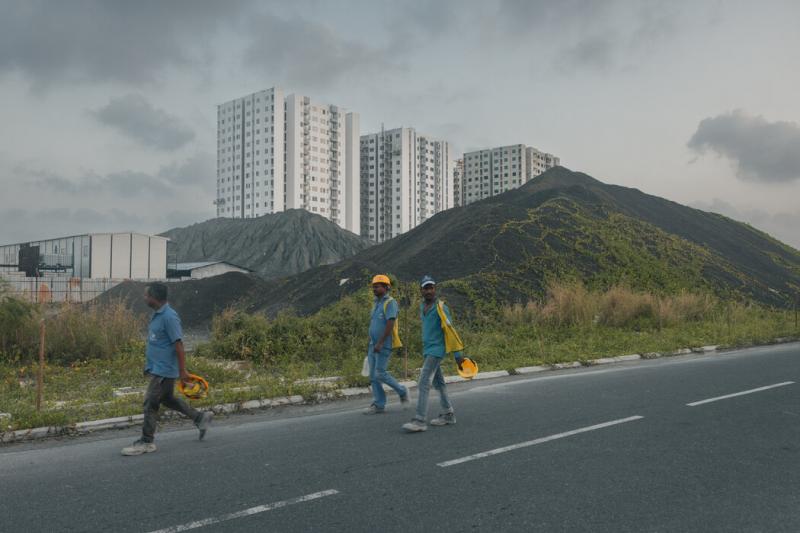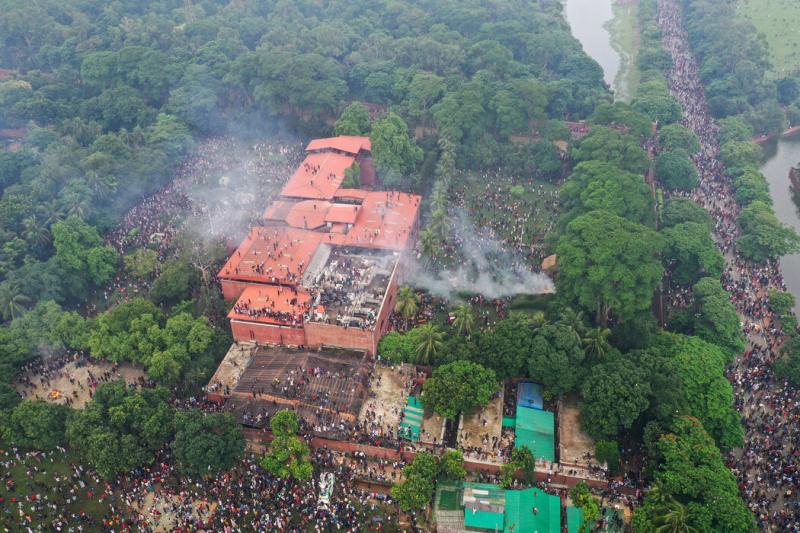
With the continuous political turmoil in India's neighbors, the government of Indian Prime Minister Narendra Modi has been using a relatively new property -the funds brought about by the rapid growth of the domestic economy -to compete with China to compete with ChinaInfluence.
Sri Lanka suffered economic disasters in 2022, India gave help, providing the country with more than $ 4 billion in assistance.In Bhutan, a border dispute with China, Modi has doubled Indian aid this year and will reach $ 1 billion in five years.He provided billions of dollars of funds for Bangladesh's infrastructure projects to support the country's dictatorship. The leader has been promoting India's interests before being kicked off in August this year.
The latest beneficiaries are Maldives.The country's new President Mohammed Mourz participated in the campaign with the banner of "India Roll out" last year, asking Modi to withdraw from a small military special team from this island country.But this Monday, all this seemed to have been forgotten. Muz attended the national banquet in New Delhi and took a picture with his wife at the Taj Mahal. He also accepted a assistance of more than $ 750 million in India to help his government get rid of get rid ofExtreme financial dilemma.
"India is an important partner of the development of the Social, economic and infrastructure of the Maldives, and has always supported us when the Maldives needs," Muz stood by Modi and said these words.

According to World Bank statistics, the Indian economy is growing at a rate of about 7%, while China and other neighboring countries are facing many difficulties at the level before the growth of growth to the epidemic.Although politics and business leaders are dissatisfied with India's bureaucracy, it is increasingly regarding India as an exciting partner for business and signing a trade agreement. The country's economy still has a lot of room for development.
Many poor Indians have not received much benefits from this growth, because India still faces difficulties in creating enough employment opportunities.However, this growth provides the government with funds that promote their diplomatic processes, and China faces economic difficulties, forcing it to reduce generosity in the region to a certain extent.
India will send new influences in hand.When China aggressively promoted its influence to neighboring countries in India, India's traditional influence in the region has weakened, and has repeatedly encountered frustration in diplomacy.In the past year, at least three countries have been eliminated in the election or stepped down in the protest.
"India can exercise greater influence in the surrounding areas, and India's economic influence is much larger than in the past -this is undoubted," Narupama Mei Nong, who was once the Foreign Minister of India ·Laoqi said."But I think the political interests that connect us with the surrounding areas are unchanged."
Even the leaders who are "traditionally considered to be anti -India or have left such stereotypes" in the region, there is no choice but to cooperate with New Delhi. Laomi said.This is not only to obtain real -time economic assistance, but also to establish a long -term ally relationship with India. I hope that India's economic potential will bring benefits to them in the future.
Regional leaders are "showing a high degree of serious attitude towards understanding India's growing economic influence and its status on the global stage," Laoqi said.Conversely, India is also taking a more pragmatic attitude to some neighboring countries to avoid "pretending to be in the cavity" and "diplomatic performances", she said.
This year, Bangladesh provides a painful lesson. This neighbor and India with a population of 170 million people have a border of 3,200 kilometers long.
India has been regarded as a strong protector of Bangladesh's increasingly autocracy, Shech Hasie's economy and diplomacy.With Harxa's persecution critics and opponents, India has used her foreign influence to persuade Western critics to shut up.Bangladesh's anger for the Prime Minister has begun to transform into anger to India.
Harxa was driven down in August this year -a large -scale protest that led to his steps down sharply heated up after the security forces killed hundreds of demonstrators -she fled to India.Hasina continued to stay in India to create a dilemma: on the one hand, India wanted to show that she was loyal to friends.However, as India tries to win the favor of the new political forces of Bangladesh, providing asylum for Harcena will bring problems.

Danan Paul Stanniland, a political scientist at the University of Chicago and the Carnegie International Peace Foundation, said that this is a challenge that may be more "usual" than ever, and said that India keeps constantly constantlyThe economic strength of growth is one of the important reasons.
"Of course, the neighboring countries of India are interested in autonomy that is not affected by India, and want to have a choice of contact with China and other external countries. But India is a huge economic and political existence.Divided with it, "Stannland said.
He also said that India's approach to some regional relations now has the characteristics of "Delhi adopts a restraint and respect to make practical efforts in cooperation", which echoes Laoqi's point of view.Steinland said that this approach "reduced the nationalist resistance of these neighboring countries and at the same time created the motivation to cooperate."
The current relationship between India and Sri Lanka is an example.
Sri Lanka's civil war ended in 2009. China has established a huge influence there to provide funds for the huge development projects that cost the nationalist president.Corporal officials, even officials sympathized with India, complained that in contrast, New Delhi has moved slowly in expanding relations with Sri Lanka, and the bureaucratic style is serious.
Two years ago, it was mainly because of poor management and expenditure without consequences. Sri Lanka's economy collapsed, which changed people's views.In the eyes of everyone, China is obviously absent and is unwilling to re -negotiate debt clauses with Sri Lanka.India seized this opportunity to provide Sri Lanka with a $ 4 billion support in various forms.
The changes in Indian practices are more obvious in politics.Sri Lanka's veterans (including politicians, which are closely related to India) lost their reputation due to economic collapse in China, and the Modi government began to show other politicians.
A few months before Sri Lanka held the presidential election in September, India received Anura Kumala Dosanata. The small party led by this person had a history of anti -India.He seemed most likely to be pushed up on the stage by the public's anger, and both sides obviously wanted to overcome the history.Last month, after Disanak won easily in the election, the highest -level diplomat in India in Colombo had congratulated him in a few hours.
Laaoki said that the traditional relationship between India and neighboring countries and growing fiscal resources will help India and China.
"China continues to show strong economic strength, which is no doubt," Laomi said."But I think that when our neighboring countries encountered a crisis, China did not really appear in the attitude of the first reactor as India. It was a very critical factor that I thought."




